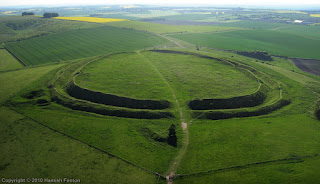Barbury Castle, Wiltshire
Here is the 'Badon Problem' in a nutshell, and it is one I've been wrestling with for decades: the place-name itself is universally held by Celtic linguists and place-name specialists to be a British form of the Old English Bathum or 'Baths.' The philological and phonological arguments are very solid.
But there are major problems with this identification. Firstly, Gildas - who claims the battle happened when he was born, and who should, therefore, have some authoritative knowledge regarding the event - claims the Saxons were soundly defeated there. This seems quite impossible for Bath in Somerset, as the English has not penetrated anywhere near this far into the West Country at this point in history.
Slightly more likely is the other 'bathum', namely Aquae Arnemetia at Buxton in Derbyshire. Buxton, however, does not fit in at all with the other battles as I've laid them out in the South of England.
I've recently identified Arthur's City of the Legion and the following battle of Tribruit with Caerleon-on-Usk and the Trajectus or Severn crossing to the Avon. Bath is, of course, on the Avon, and so would fit in well with this grouping as Badon. But, the intervening battle of Mount Breguoin/Agned must give us pause.
I've shown how the meaning of the root of the place-name Breguoin (= Brewyn/Bremenium) matches that of the root found in the Liddington place-name that was given to the Badbury hill fort in Wiltshire. Agned is for Egnatius, the name of a Roman governor who became associated with Bremenium. This is too much of a coincidence, and I'm fairly certain Breguoin is here a substitute for the English place-name Liddington.
Liddington
'Farm/settlement on the stream called Hlyde (= the noisy one)'. The water-course is on record as the Lid Brook.
Elements and their meanings
hlȳde (Old English) A noisy stream (literally a loud one.
tūn (Old English) An enclosure; a farmstead; a village; an estate.
Refs
Watts; Cambridge Dictionary of English Place-names 372
E. Ekwall; Dictionary of English Place-Names 297
A.D. Mills; Dictionary of English Place-Names 298
"Gover, Mawer and Stenton, The Place-Names of Wiltshire" 282
I have noticed that there is a Lid Brook a few miles ENE of Bath as well. While I tried making a case for Bury Wood Camp being named for the Lid Brook, the truth is that the hill fort is between two branches of the Doncombe Brook, with the Lid being a fair distance to the south. Nor could I make a case for the Lid Brook once being the original name of the By Brook river, for this last was originally called the Weaver. Here are the early forms and the etymology for the By Brook (as kindly supplied to me by Ally McConnell, Archivist, Wiltshire and Swindon Archives, Wiltshire and Swindon History Centre, who was drawing from THE PLACE-NAMES OF WILTSHIRE):
What this means is that the 'Badon' identified with Breguoin has to be Liddington Castle.
I've also demonstrated that the so-called Second Battle of Badon of the HISTORIA BRITTONUM would appear to be a reference to the ANGLO-SAXON CHRONICLE'S account of Cenwalh's being driven to Ashdown by Wulfhere. Ashdown is only a few miles from the Liddington Badbury and we might assume that the ravaging went right past the hill fort.
As I see it, there are two possible solutions to the 'Badon Problem:'
1) Very early on the superficially similar names Bathum/Badon and Baddan(-byrig) were confused in the Welsh tradition. Gildas or his source may not have been responsible for this, but subsequent copyists certainly could have been. Thus what should have more closely resembled Baddan- ended up, merely by mistake, as Badon. Eventually, the incorrect form became accepted as canonical, while the correct one was forgotten.
OR
2) Modern linguists are, at least in this one case, overly strict in disallowing the possibility that Badon actually represents Baddan(-byrig) and not Bathum. In other words, that some otherwise unexplainable development took place which transmuted Baddan- to Bathum.
My own feeling is that it is far more likely the ancient Welsh are the ones to blame for the place-name switch. They were far less astute in the science of language evolution than today's scholars. In this respect, then, the linguists and place-names experts are both right and wrong: they are right in that Badon cannot be the linguistic equivalent of Baddan-, but they are wrong if they insist that precisely because this is so Badon cannot be the Liddington Badbury.
For what it's worth, Liddington Castle has my vote as Arthur's Badon.



No comments:
Post a Comment
Note: Only a member of this blog may post a comment.